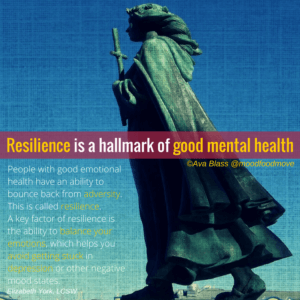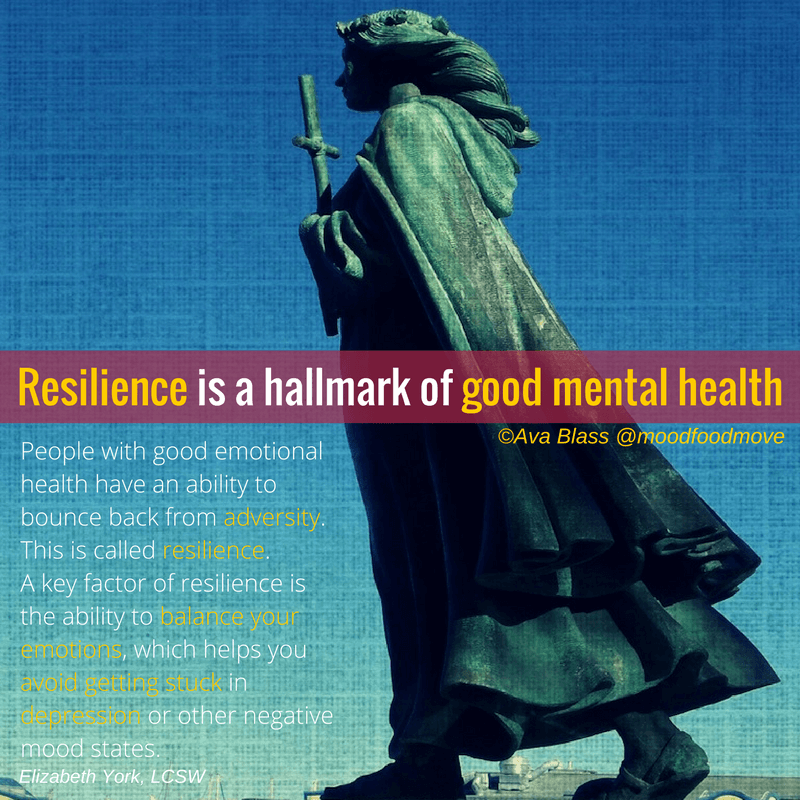 Bad luck and adversity happen to everyone. After they pass we need to dust ourselves down and get on with life. Yet people prone to depression and addictive behaviors are especially vulnerable to the affects of stress. We don’t bounce back, and instead the stress sends them into a tailspin. So what can vulnerable folk like us do to get ourselves through life balanced, happy and intact? The answer is by developing our resilience.*
Bad luck and adversity happen to everyone. After they pass we need to dust ourselves down and get on with life. Yet people prone to depression and addictive behaviors are especially vulnerable to the affects of stress. We don’t bounce back, and instead the stress sends them into a tailspin. So what can vulnerable folk like us do to get ourselves through life balanced, happy and intact? The answer is by developing our resilience.*
Where does resilience come from?
Resilience is one of the components of durability: the ability to sway within life. Despite wishing otherwise it’s unrealistic to expect to have a perfectly serene life, devoid of stress, drama or disappointments. Therefore, if we’re smart we can build in protections so that when the winds of misfortune howl we don’t collapse into depression or addictive behaviors… but instead we sway with it.
This is durability: swaying and coming back to center, after life deals you a blow.
You can see why durability is important. If you can’t sway back to center, any period of stability in your life will feel tenuous. A calm between storms. You’ll nervously await the next overwhelming event to catapult you into depression or addictive behaviors. Only to again painfully claw yourself back to ‘stability’.
Our experience of relapse tells us that it doesn’t just happen. Relapse is a process that follows a sequence. Nevertheless, the process of relapse has to start somewhere, by the release of a trip-wire which sets it all into motion. Often it’s because you never fully regained your balance after the previous major disruption. You were still teetering with instability. You were not durable, you bent, you broke, and you stayed broken.
Three components make up our durability:
1) a strong foundation, 2) contingencies, and 3) resilience.
I believe you should focus the most effort on resilience, if you are prone to depression and addictive behavior. It’s resilience which reinforces a stable base on which to build a happy and balanced life. Resilience brings you back to center.
We’ll focus on resilience for the rest of this article.
1. Resilience transforms the quality of your life
As adults your innate resilience is not fixed, and can be built up. Build up your resilience! It’s a valuable character trait, which has the ability to transform the quality of your life.
By developing resilience we find ways to protect ourselves against potentially overwhelming experiences. Experiences which could otherwise have lead to a nose-dive into relapse. Instead, as your resilience grows you’ll experience increasingly longer periods of stability because you’ll quickly slot back into your routine.
The alternative would have been for each successive challenge to pile atop the previous one. Your growing resilience will give you periods of reprieve (yes, reprieve!!). Reprieve is where we live our lives.
2. Resilience can compensate for screw-ups
Resilience is protective, and buffers us from bad choices. It’s got your back, it has you covered. Good resilience can compensate for the failure to look ahead, and for not having contingencies in place. Because without contingencies your silly mistake could mean your mood or sobriety is challenged. But by being resilient you can bounce back quickly, and return to your core routine. So, that screw-up didn’t progress into a major derailment of your mood or sobriety.
Resilience will also compensate for the weak foundation of an unhealthy lifestyle. The late nights, processed food, or lack of exercise are not conducive to good mental wellbeing – you’ll be more prone to stress, or getting caught up in dramas and sagas. You can’t advance in your recovery if you have destructive lifestyle habits. But, if you are resilient and venture into a period of poor choices, the dam won’t break. Instead, you’ll dust yourself down, move on, and get back on the program quickly.
3. Resilience reminds you I-Can-Do-This!!
Resilience’s greatest impact is on our psychological wellbeing, in my belief. Your self-confidence goes up whenever you get a couple of days of being on track, under your belt. There is positive feedback between each successful bounce-back and the feeling of I-Can-Do-This!
You’ll be saying: “Wow, a couple of days ago I was lost in the depths of depression – now I feel like I’m doing OK, and I can do this.”
The small confidence boosts arising from each success add up. I call those little successes: “half-a-percents”. Life improves as those half-a-percents accrue, because life gets easier when you believe in your abilities.
4. Resilience helps you to like yourself
Resilience helps you to like yourself, by having a positive influence on your tattered self-esteem. Low self-esteem is endemic in addiction and depression. It’s a risk factor for both conditions, and is exacerbated when depression and addiction symptoms take hold.
Self-esteem is directly proportional to what you do, thereby giving you a way to escape the low self-esteem pit. Every time you learn a new skill, your self-esteem goes up a little. Every time you achieve something, your self-esteem goes up a little. And equally… every time you successfully bounce-back from a low place and get back on-track, your self-esteem goes up a little.
Don’t undervalue the importance of each small success. It is through them that you will develop a gentle pride which tells you that you’re OK – and you can do this.
I hope I have convinced you why resilience is a superpower people, which prone to depression and addiction most need work on. A future article will feature the many ways that you can build your resilience.
Take good care of yourself
Ava x
Before you go, try this:
- Watch this lovely video: Resilience: Increase Your Inner Strength
- Take this quiz: How Resilient Are You?
*This article was written when moodfoodmove’s focus was people affected by depression and addiction. Whilst we very much still care about this group, our advice re taking better care of yourself (via good nutrition, healthy lifestyle and a positive mindset) applies equally to all of us. We ALL need to take better care of our mental wellbeing.

